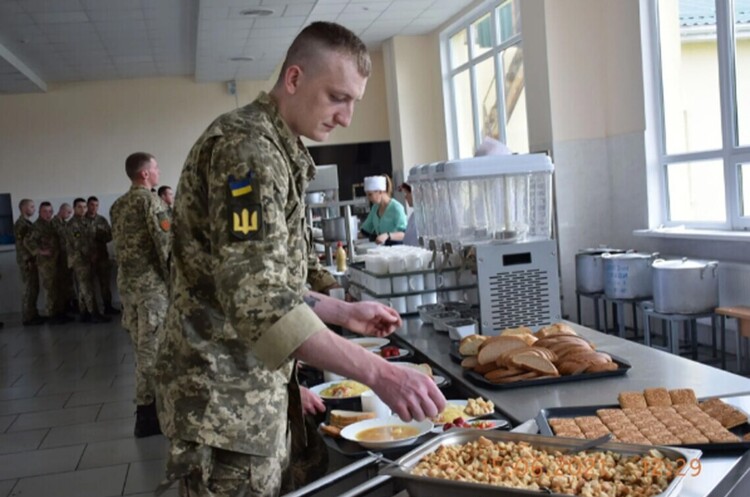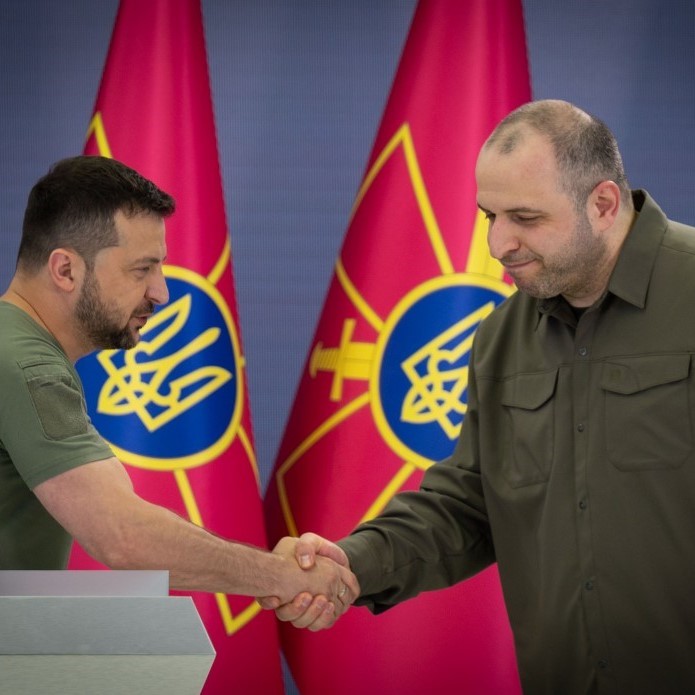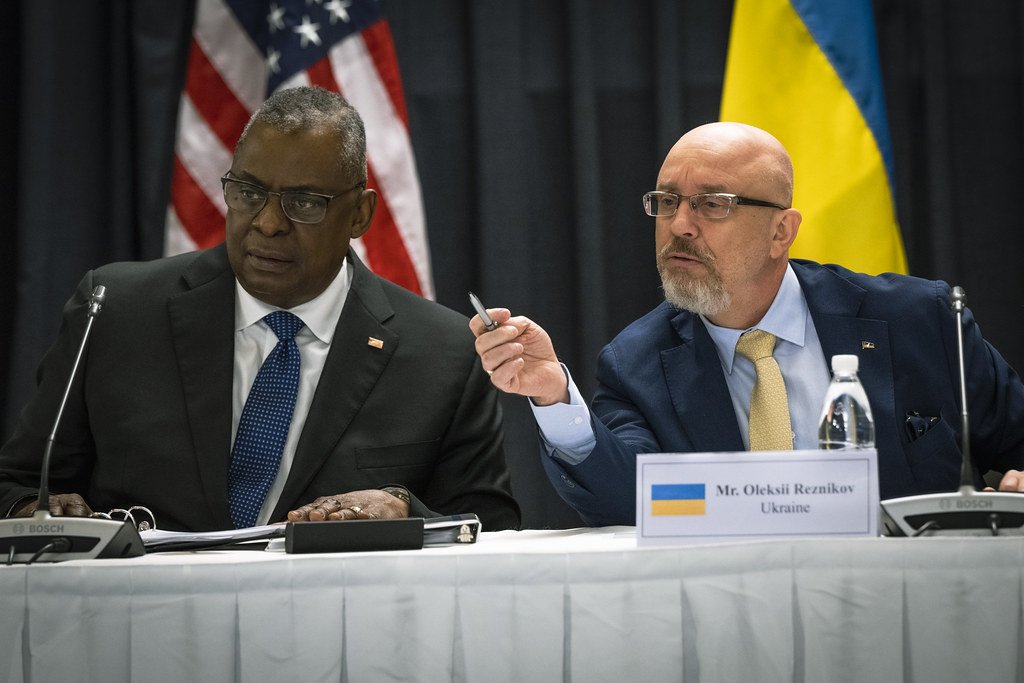Finally, president Volodymyr Zelensky intervened at the ministry of Defence. The replacement of minister Oleksi Reznikov with Rustem Umerov was a response to crises that could have been prevented, writes Glib Kanievsky, if the government had timely reformed the defense procurement system earlier. A short analysis.

Army mess in Ukraine. Picture Facebook1OTSB
By Glib Kanievsky
Early September, the President of Ukraine Volodymyr Zelensky announced the decision to replace the Minister of Defense. According to Zelensky, the Ministry ‘needs new approaches and different formats of interaction with both the military and the society in general.’ Oleksi Reznikov, who had chaired the Ministry of Defence since 2021, resigned. Rustem Umerov, a former MP from the moderate opposition party Holos, has taken his place. Over the past year, Umerov headed and reformed the State Property Fund of Ukraine, a body that manages most state-owned companies. He also participated in international negotiations on the supply of weapons to Ukraine and the exchange of prisoners with Russia.
Umerov’s key advantage is his clean governmental service record, free of shady doings. After all, corruption scandals in the Ministry of Defense became one of the key reasons for Reznikov's dismissal, if not the root cause of it.
During Reznikov’s ministerial tenure, his subordinates faced allegations of procuring weapons and ammunition without any procedures. Tens of millions of dollars were paid in advance to suppliers with a dubious background, and the goods were never received. The acquisition of food and military uniforms at inflated prices is yet another issue. Reznikov faced political responsibility, although he rejected the accusations. As a result, officials of the Ministry of Defense directly involved in the scandals became subject to investigation.
Now Rustem Umerov will have to deal with an obsolete and obscure procurement system, which, in fact, gave rise to these scandals. If the new minister fails to change this system, society might soon demand his resignation as well.
A military Amazon
To resist the Russian invaders, Ukraine needs a lot of weapons, which it cannot produce on its own. Some of them are provided by foreign partners for free, the rest has to be obtained abroad. In the summer of 2022, the Ministry of Defense created the Defense Procurement Agency, designed to implement effective procedures for the purchase of weapons and ammunition outside of Ukraine. In August 2022, Oleksi Reznikov expressed the ambition for this agency to be more than just a special goods importer. ‘It should ideally be a kind of military Amazon.’
The agency was supposed to attract professional buyers from outside the Ministry of Defense system and develop and implement algorithms for the competitive selection and integrity control of suppliers. In May 2023, the government designated the Agency to be the key budget holder for the procurement of weapons and ammunition. According to the results of 2023, it is expected to spend up to ten billion US dollars on purchases – a quarter of the annual budget expenditures on security and defense.
2.75% of the defense budget is allocated for the agency’s maintenance costs. In 2023, this will result in about 280 million dollars. The Agency employs no more than 150 people; that means $1.86 million per single staff member. Meanwhile, the Ministry did not introduce any competitive procedures for the acquisition of weapons and ammunition. Agency officials select suppliers and approve contract amounts as they see fit.

Minister Rustem Umerov (right) and president Zelensky. Picture Wikimedia Commons
There is no transparent agency management system. An oversight board could provide transparency, but as the Center for Combating Corruption, a Ukrainian non-governmental organization that fights corruption in government institutions, found out, the Ministry of Defense does not plan to create a supervisory board for the Defense Procurement Agency until the end of the war. For now, the Agency's Director, who reports only to the Minister of Defense, has sole control over a quarter of the defense budget.
Overpriced eggs
About a million people serve in the Military Forces of Ukraine, about 700,000 of them in the Armed Forces. It is the responsibility of the Ministry of Defense to provide the servicemen with meals, clothes, accommodation, heating and necessary ammunition. And this is where the most serious and well-founded suspicions of corruption arose.
Until February 24, 2022, the Ministry purchased food, uniforms, ammunition, fuel and other non-military goods through open competitive bidding in the Prozorro electronic system. This system is quite closely scrutinized by investigative journalists and anti-corruption organizations. When the full-scale invasion broke out, the Parliament authorized the Ministry of Defense to make procurements at its discretion.
In January 2023, Yuri Nikolov, an investigative journalist from the organization Our Money, which specializes in procurement analysis, published incriminating material in the newspaper Dzerkalo Tyzhnia (Mirror of the Week). He claimed that the $377 million contract for the purchase of food for the army had inflated prices for some goods. Readers were particularly astonished by the price of chicken eggs: the Ministry purchased them in bulk, without a bidding, at 47 cents per piece, while the average price in a Kyiv supermarket at the time was 19 cents.
The officials explained that such deals involve approximated prices, supposedly to simplify calculations. However, as a result of the scandal, procurement prices were lowered to the market level, in particular for eggs. The Minister, who consistently denied the facts presented in the investigation, did not resign. The authorities and pro-government opinion leaders explained that Reznikov is too important a figure on whom international agreements on the supply of weapons to Ukraine effectively depend.
Yuri Nikolov did not give up, and in August 2023 he published a new investigation, this time focusing on winter military uniforms. His sources in the military showed him a contract of $33 million for the supply of winter jackets and pants, signed in 2022 with the Vector Avia Hava Araçlari Turkish company. The full amount was paid in advance, although there was no guarantee that a company without a market record would be able to deliver such a large order. The investigators found out that even though the company is Turkish, one of its founders is a 26-year-old nephew of Gennadi Kasai, an MP from the ruling Servant of the People party and a member of the Committee on National Security and Defense. That is, a person who should control the transparency of army procurements.
The investigator also claimed that the price of the jackets was inflated, and in general they turned out to be a summer outfit rather than one made for the winter. Although it turned out impossible to prove this, the doubts were not completely dispelled. Society received no explanation why the jackets were bought from a ‘Turkish’ relative of a politician from Zelensky's party. Further investigations showed that the Ministry of Defense paid a total of 54 million dollars to the Turkish company under all contracts.
Finalizing the defense procurement reform
According to the results of the sociological survey Corruption in Ukraine 2022: Understanding, Perception, Prevalence, 64% of Ukrainians consider corruption to be one of the three most serious problems of their country. Corruption in defense procurement, an area vital for a country fighting for its integrity and independence against Russian aggression, is considered unacceptable.

Former minister Oleksi Reznikov with his American colleague Lloyd Austin (left). Picture Chad J. McNeeley
The Ukrainian authorities are aware of such sentiments among people, so they responded to the scandals in the Ministry of Defense. After the story with the eggs, Oleksi Reznikov founded the Anti-Corruption Council. Members of this council were selected by open online vote. Among them were volunteers, human rights defenders and even journalists who investigated the work of the Ministry of Defense. Activists of anti-corruption organizations gained access to contracts awarded by the Ministry during the war. In Ukrainian history this is an indisputable precedent.
At the same time, the Parliament changed the law on defense procurements, obliging the Ministry of Defense to publish the price of non-military goods and services per unit from concluded contracts. Some publicly accessible tenders of the Ministry of Defense were moved back to the Prozorro electronic system, saving 119 million dollars already in the first competitive biddings for food supply services.
After the winter jacket scandal, the Minister established the Supply Agency, a professional procurement body for non-military goods for the Ukrainian army. In October 2023, the newly created agency plans to conduct the first auctions in the Prozorro system.
These innovations are a response to the crises that could have been prevented, had the state leaders and the Ministry of Defense timely reformed the defense procurement. Rustem Umerov will need to complete this process and demonstrate to society that taxpayers' money is transparently, prudently and responsibly spent on defense, Ukraine’s crucial need. From the very start Umerov has to be an ally rather than an opponent of the civil society that demands integrity.
Analyzing the mistakes of former Minister Reznikov's tenure, the new minister could use a few suggestions.
First, both procurement agencies must be chaired by professional CEO’s with a reputation of integrity.
Second, a transparent system of management and accountability has to be introduced in both agencies. This should include not only independent professional supervisory boards but also independent internal audit committees and compliance officers who are directly accountable to their boards. The representatives of key international allies have to be invited to take a seat in supervisory boards. This entirely corresponds to OECD standards that the Ukrainian government aims at. Besides, it is not a secret that nearly 50% of the national budget of Ukraine consists of US and EU funds.
Lastly, the Umerov`s team has to find a balance between security and transparency of procurements. On the one hand, the tender procedures have to be protected from intelligence by the enemy. On the other hand, there has to be enough transparency and competition to prevent disgraceful corruption.

About the author
Glib Kanievsky is chairman of the think tank StateWatch, an Ukrainian ngo based in Kyiv. Kanievsky leads a joint project of StateWatch and the National Agency for Corruption Prevention to combat corruption risks in budget spendings and activities of big public companies. Before the Russian full-scale invasion, he led a project focused on corruption risk prevention in Ukraine’s defense industry. Following the start of the all-out war, Kanievsky started to manage a project, which is tasked with strengthening the sanctions against the Russian establishment and their proxies in Ukraine. Kanievsky also has been working as an independent investigative reporter since 2012 for various media outlets.
